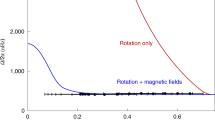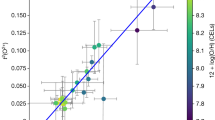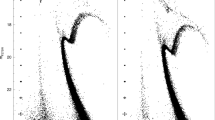Abstract
THE simple Cowling model of a star of small mass with a convective core and radiative envelope is of considerable importance in view of Bethe's theory of energy generation, which demands a stellar model of the convective radiative type. It appears possible to use this simple model so as to conform to Bethe's formula of energy generation on one hand and furnish an approximate value of the hydrogen content of a star of small mass on the other. For formulæ relating to the Cowling model we shall refer to Chandrasekhar's "Introduction to the Study of Stellar Structure", pp. 351–54. The constant x0 in Kramers' opacity formula will be taken as 3.9 × 1025 (1 – x2)/t̄, where tmacr; is the mean guillotine factor, and x the hydrogen content; helium content being assumed zero.
This is a preview of subscription content, access via your institution
Access options
Subscribe to this journal
Receive 51 print issues and online access
$199.00 per year
only $3.90 per issue
Buy this article
- Purchase on Springer Link
- Instant access to full article PDF
Prices may be subject to local taxes which are calculated during checkout
Similar content being viewed by others
Author information
Authors and Affiliations
Rights and permissions
About this article
Cite this article
SEN, N., BURMAN, U. Hydrogen Content of the Sun and of Stars of Small Masses. Nature 153, 166–167 (1944). https://doi.org/10.1038/153166b0
Issue Date:
DOI: https://doi.org/10.1038/153166b0
Comments
By submitting a comment you agree to abide by our Terms and Community Guidelines. If you find something abusive or that does not comply with our terms or guidelines please flag it as inappropriate.



